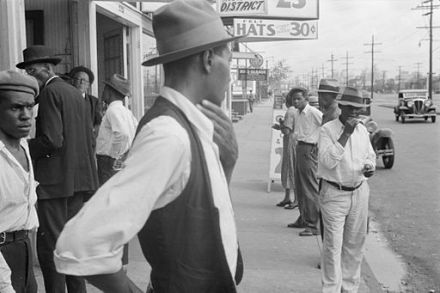Despite the efforts of his wife Eleanor and African American leaders, President Franklin Roosevelt’s administration made little progress on civil rights.
New Deal programs discriminated against blacks. For example, under the Works Progress Administration, blacks received less pay than whites for the same work. This was especially true in the South. The discrimination was somewhat eased by the intervention of Eleanor Roosevelt, who personally viewed the struggles of blacks during visits to WPA projects. She wrote, “It is all wrong to discriminate between white and black men!”
FDR agreed to sign an executive order barring discrimination in the WPA. One million black families benefited from WPA wages. However, discrimination in other parts of the New Deal persisted. The Federal Housing Authority refused to help blacks trying to buy houses in white neighborhoods. The National Recovery Administration persisted in paying black workers less than whites. Even the Social Security Act excluded the menial jobs that most blacks held.
For black leaders, however, the most frustrating issue was FDR’s stance on the anti-lynching bill introduced in Congress in early 1934. Although twenty-six African Americans were killed by mobs the year before, FDR took no stance whatsoever on the bill. The Amsterdam News commented on FDR’s lack of support for the bill using the headline “Here’s Mr. Roosevelt’s Message on Lynching.” The article contained one sentence, “In his annual message to Congress last Friday President Roosevelt had the following to say about lynching:” That sentence was followed by a large blank space.
FDR tried to explain to African American leaders why he could not back the bill. He told NAACP Executive Secretary Walter White, “I did not choose the tools with which I must work.” In order get votes for New Deal programs, FDR felt he couldn’t antagonize Southern Democrats by supporting a bill they found offensive. He told critics “you have to wait, even for the best of things, until the right time comes.” Apparently FDR never thought there was a right time to support an anti-lynching bill. Although members of Congress proposed other anti-lynching bills during his long presidency, he never backed them.
In contrast to her husband, Eleanor publicly backed the anti-lynching campaign. When Walter White asked her to attend a NAACP art exhibit called “A Commentary on Lynching,” Eleanor lent her support. Interestingly, FDR did not attempt to stop his wife’s actions. Perhaps FDR agreed with her privately, but Eleanor’s actions also encouraged to blacks to switch their allegiance from the Republican party of Abraham Lincoln to FDR and the Democrats. Ever the politician, FDR was likely happy to have his wife express her feelings to get the African American vote while he placated Southern voters by saying nothing.
Sources:
The Eleanor Roosevelt Papers Project at George Washington University
The Roosevelts: An Intimate History by Geoffrey Ward and Ken Burns
No Ordinary Time by Doris Kearns Goodwin


Hi Heather! I love this period of history, and have a personal connection. My husband’s uncle was named Paul Swaity, and he was involved with the labour unions, and getting the Blacks into the factories against the will of very strongly prejudiced managers and Caucasian workers. He told us very exciting stories about being chased out of town and meeting his wife, Opal Swaity, in some secret location. He was also good friends with Eleanor Roosevelt.
LikeLike
Hi Sharilee. So glad you’re here and enjoying the blog. Thanks for sharing your family history. While I was at Hyde Park doing research I took a tour of Val-Kill run by an African-American lady who knew Eleanor Roosevelt. The experience gave me goosebumps, but in a good way!
LikeLike